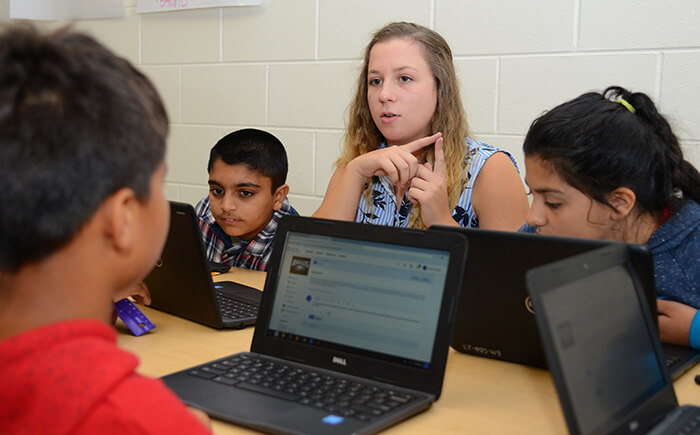Thirty-two students from Wilmington University’s College of Education have spent the entire school year as full-time teachers.
Story by David Bernard
Photos by Susan L. Gregg
Thirty-two students from Wilmington University’s College of Education have spent the entire school year as full-time teachers. This in-depth, on-the-job learning has been an extraordinary opportunity for them, but this year — for the first time in Delaware — they’re also getting paid for their efforts. It’s all part of WilmU’s Yearlong Residency initiative, a training program that’s transforming the way teaching is taught.
“The Yearlong Residency is an immersive experience,” says Assistant Professor Tyler Wells, who chairs the College of Education’s Office of Clinical Studies. “It’s learning by doing, which is the best way to learn. And the compensation we’ve been able to provide this year opened the experience to even more students.”
For those aspiring to careers in the classroom, WilmU’s innovative teacher preparation program can make a monumental difference. Here’s how:
My Yearlong Residency has given me an opportunity to experience moments that traditional student teaching would not. For instance, the first day of school. When has a student teacher ever truly experienced the first day of school?
—James Stiner, Master of Education in Elementary Studies candidate, student teacher at Shortlidge Academy in Wilmington
As long as there have been teachers, there have been students learning how to teach. While formal apprenticeships are a relatively recent invention in educational careers, most states include student teaching among their requirements for teacher certification and licensing.
In Delaware, teacher candidates must perform at least 10 weeks of student teaching to make the grade. Many teacher preparation programs, including Wilmington University’s, incorporate a 16-week semester of shadowing a mentor teacher. Since 2014, however, WilmU’s College of Education has offered a radical alternative to this traditional pathway.
The Yearlong Residency initiative enables undergraduate and graduate education students to devote their final year of studies to collaborating with a mentor teacher, from setting up the classroom to closing for the summer.
“Our students are actually working alongside their mentor teachers every single day,” says Wells, “sharing all the responsibilities of the classroom. Their coursework is embedded into the residency as they plan and deliver instruction, as they observe and influence student development. They attend meet-the-teacher night and parent conferences. They take part in in-services and standardized testing. They’re real teachers.”
The sustained nature of WilmU’s Yearlong Residency — the only such teacher preparation program in Delaware, and one of only a handful nationwide — equips student teachers with an understanding of the job’s culture and demands that coursework or even short-term teaching assignments wouldn’t convey, says Wells.
“The first year of teaching can be very challenging,” he says, “but extended clinical experience can help to create ‘day-one ready’ teachers.”
Kaycee Bean, student teacher at East Millsboro Elementary in Millsboro
The opportunity to spend an entire nine months learning is priceless in comparison to a traditional student teaching placement. I feel like a genuine part of the school staff. There is a much broader timespan to learn everything I possibly can, and to figure out how to be a better teacher to my students.
—Kaycee Bean, BS in Elementary Education candidate, student teacher at East Millsboro Elementary in Millsboro, Delaware
The Yearlong Residency’s real-world application of teaching strategies reflects WilmU’s career-focused and cooperative-education-friendly mission. But the opportunity is out of reach for many of WilmU’s aspiring teachers, particularly those who cannot give up their day jobs while pursuing their dream jobs, or manage part-time work alongside a full-time educational experience. While some individual school districts offer small stipends to the teacher candidates learning in their classrooms, not everyone can afford to take part in an entire school year.
“Teaching is one of the only professions where, during a residency, the candidate goes unpaid,” says Wells. “Medical residents get paid. Why not student teachers?”
A Chicago-based non-profit organization agrees with Wells, and is backing his suggestion. In June 2017, the National Center for Teacher Residencies named WilmU’s College of Education as one of four recipients of its annual Supporting Effective Educator Development Grants. The $500,000 grant, which recognizes innovation in teacher preparation, is lending a financial hand to this year’s yearlong residents in the form of a $14,000 stipend for each of the 32 over the course of the 2018-19 school year. (The NCTR’s grant is also subsidizing the registration costs of professional development and training seminars for their mentor teachers throughout the year.)
“This is where our program is really revolutionary,” says Wells. “The compensation from the grant helps to lessen the financial strain on our teacher candidates who are unable to work outside jobs during the academic year, given the rigor and requirements of the residency program.”
Along with a unique tuition benefit — yearlong student teachers receive a 50 percent reduction in tuition fees during their residency — the grant’s funding has enabled more Yearlong Residency participants to dedicate themselves to their teaching responsibilities with fewer worries about the cost of living.
The stipend has afforded me the opportunity to not have to work a second job on nights or weekends as I work to plan and create engaging, meaningful lessons for my students. I am able to fully immerse myself into this experience, not only at school during the day, but at after-school events where I can get to know my students and community better.
—Natalie Tucci, BS in Elementary Education candidate, student teacher at Richey Elementary in Newport, Delaware
The College of Education doesn’t guarantee entry into the Yearlong Residency for any of its students. They have to meet the qualifications to take part in the opportunity.
“There are levels of rigor in how we select the candidates, the school districts, and the school sites,” says Wells. “There’s a matching process for how we team our candidates with teachers.”
First, though, there are the eligibility criteria: a record of coursework that’s aligned to the chosen education degree’s requirements: minimum grade-point average of 3.0 in the previous semester or transfer semester; completion of the Praxis II standardized teacher certification exam for the age group or subject matter the student aims to teach by June of the academic year prior to the residency.
A series of screenings and interviews with College of Education faculty and administrators from the school districts that have partnered with WilmU to establish and maintain the Yearlong Residency initiative — currently Red Clay, Colonial, and Appoquinimink in New Castle County, Capital in Kent County, and Indian River in Sussex County — are also instrumental in determining a student’s suitability for the residency and the schools and classrooms where they’ll best fit.
Jordan Larimore, student teacher at Towne Point Elementary in Dover
I applied for the program because I understood the value of watching the same class of students as they progress from the beginning to the middle to the end of the school year. It’s impossible to be as immersed in a school’s culture and its student population in a traditional student teaching semester. The Yearlong Residency is going to give me the confidence I need to efficiently run my own classroom.
—Jordan Larimore, BS in Elementary Education candidate, student teacher at Towne Point Elementary in Dover, Delaware
The lessons learned from a year in the classroom as both a student and a teacher are unlike any gathered from the previous three years at Wilmington University, according to four participants in the current class of yearlong residents, each of whom is anticipating graduation this May.
“Academically, I am gaining most of my education through the events of daily classroom life instead of lectures,” says Larimore. “I’m spending a large portion of my time learning from experience and asking questions, rather than reading a textbook or turning in required assignments.”
These lessons are likely to make a difference in how they’ll begin their teaching careers, says Tucci.
“The hands-on approach allows me many opportunities to learn, to practice and to reflect, with consistent feedback from my mentor teacher,” she says. “Now I understand how everything fits together, and I know what it takes to run a successful classroom. It’s been overwhelming at times, but after this experience, I’ll essentially have my first year of teaching under my belt.”
What’s more, the lessons that the Yearlong Residency teaches are also likely to affect how its participants will develop as educators.
“By stepping into a yearlong role, I have been able to make meaningful ties with the community,” says Stiner. “This allows me to cultivate a greater understanding of the impact of trauma and the availability of resources on young learners, and to observe the teaching process from implementation to intervention to outcome. This unique experience will inform my teaching for many years to come.”
“We are essentially co-teachers, not student teachers,” says Bean. “I’ll admit, it’s sometimes a lot of work. But nothing else would prepare me for a career in teaching like the Yearlong Residency will.”
WilmU’s College of Education still offers the traditional semester-long student teaching option, which included 42 students in the Fall 2018 semester and more than 60 this spring, but it hopes to sustain its yearlong experience as well.
Wells says he and his colleagues are researching local and national sources of philanthropic funding that would allow the school to keep compensating its yearlong residents’ efforts, and enable more students to take advantage of the opportunity, once the NCTR grant expires at the end of the 2018-19 academic year.
The value of the Yearlong Residency initiative is evident, he says, not just in the success of its graduates, many of whom have been hired by the districts and schools where they served as student teachers, but in the growth of the program’s participation.
“From nine students in academic year 2014-15, we now have 32 students this year,” he says. “That’s not because of the grant. That’s because of the power of the program. Our candidates know it’s a better way to become a teacher.”



